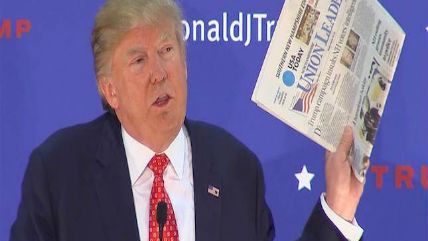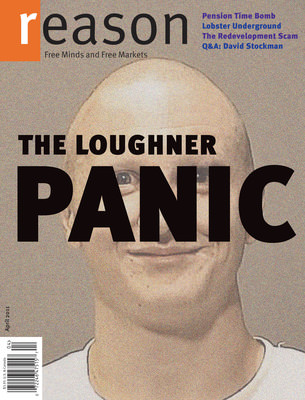Donald Trump Did Not Create the Anti-Media Fervor on the Right
Blame Gianforte on Gianforte. Blame the trollish anti-media reaction to it on a phenomenon much older than Trump's political career.

Predictably, the alleged criminal assault of Guardian reporter Ben Jacobs last night by Montana congressional candidate Greg Gianforte has turned into a pin-the-blame-on-Donald-Trump exercise. And not just from a journalistic class ever eager to seize any club with which to whack the 45th president—here's Rep. Mark Sanford (R-S.C.), admittedly a persistent thorn in Trump's side (the distaste is mutual), but still very much a Republican:
Here's @RepSanfordSC on Gianforte and politics in the age of Trump: 'There is total weirdness out there.' pic.twitter.com/Le48yCAksk
— Mike DeBonis (@mikedebonis) May 25, 2017

There is certainly much more connective tissue and surface similarity between Trump and Gianforte than Sarah Palin and Jared Loughner, though I suppose most any number is larger than zero. Trump did make several cavalier statements during the campaign about knocking the crap out of protesters, and his treatment of the media as an "enemy" has been continuous. But I'm against the Transitive Property of Incitement here for the same reason I always am—it robs violent aggressors of their own hard-won agency, and it gives statist politicians an excuse to tighten the expressive noose. It's possible/probable that I lack sufficient dot-connecting imagination, but until shown otherwise I'm going to stick with the wild theory that Greg Gianforte is an unusually rageaholic asshole.
Because our tribal stupidity and disingenuous blame-shifting comes in two main flavors in this country, let us not forget that an even more strained contextual explanation for the Montana bodyslam has been percolating, most notably by Rep. Trent Franks (R-Ariz.): "The left," Franks told MSNBC, "has precipitated this tense, confrontational, approach throughout the country in recent months." What this has to do with a political reporter asking a congressional candidate about a Congressional Budget Office score is beyond me. It's true that the recent Nazi-punching debates on the left have been disturbing, and it's also true that Gianforte wasn't exactly confronted last night by a card-carrying member of Antifa.
The Trump-made-this-possible theory may be an open-and-shut case for the likes of Don Lemon, but it suffers from a similar fatal flaw that a lot of the withering obituaries for Fox News impresario Roger Ailes did last week: It gave the guys at the top of the (hated) conservative pyramid far too much credit for inventing and then cynically profiting from a pathology, rather than for recognizing and catering to an underserved market segment. To put it plainer, neither Trump nor Ailes conjured up anti-media sentiment from scratch—they knew that their core audience was routinely ignored or disrespected by the gatekeepers of media and culture and politics, so they presented a conspicuous alternative, one that always gives prominence to an anti-media/elite critique.
So yes, Trump's anti-media lines were always some of the biggest applause generators at his campaign rallies, from the very beginning. But you know what? The same was true for Ted Cruz. And Ben Carson. Hell, even Jeb Bush and Carly Fiorina were getting their biggest responses by going after the media at the 2016 Conservative Political Action Conference. As Jesse Walker pointed out yesterday, the anti-media element of the political culture war has been with us, very strongly, since at least Richard Nixon and Spiro Agnew. With newspapers from 1960-2000 busy with the work of consolidation, professionalization, and New York Timesification, the more tabloid, populist, and conservative values long associated with American newspapering and pamphleteering were consciously and ahistorically shoved aside (read Jack Shafer's great obit of Roger Ailes on this point), meaning that almost every new technological crack in the media edifice has been breached at first with a firehose of non-lefty content. When the journalistic class reacted to each new turn with abject horror, the cycle of mutual alienation and open antagonism continued anew.
Is it any accident that among the biggest skeptics of Ben Jacobs' plight last night were veterans of two of the longest-running conservative media watchdog organizations?
Let's ask why on Earth a House candidate in Montana should have to answer questions from a reporter for a BRITISH newspaper????
— Tim Graham (@TimJGraham) May 25, 2017
Jacobs is an obnoxious, dishonest first class jerk. I'm not surprised he got smacked.
— Brent Bozell (@BrentBozell) May 25, 2017
The intellectual cul de sac of the Bozellian approach is obvious to his media antagonists, but worth reiterating: By focusing obsessively on media bias, you end up creating your own flavors of the stuff. (And libertarians know too well how easily anti-media critics end up becoming pro-state apologists during Republican rule.) Less obvious to my friends in the press is that the critics they despise have a good goddamned point: The media is biased, often ridiculously so, and swimming all day long in a pool of anti-Trump hysteria is enough to drive even some of us Trump-averse types to the borders of anti-anti-land.
If standard-issue journalists and commentators were more interested in persuading those who don't necessarily agree with them, they'd stop trying to elevate each and every nothingburger Trump story to Defcon 1, and instead be content to follow along the investigative facts being competitively unearthed on a daily basis by the Washington Post, New York Times, and others. And if Fox News wants to reverse its alarming slide into third place, it should find a way to engage usefully with the Trump-generated bombshell of the day, rather than retreat behind media-bias lead stories and #MAGA hashtags.
But old habits die hard, not just in media organizations but among the consumers who take comfort from them. Of all the news items that we could be talking about this week (including, it must be said, acts of violence much more serious than Ben Jacbos getting his glasses broken), do you know what Fox has devoted well over a half-dozen segments to? Katy Perry reacting to the Manchester bombing with the hippy-dippy declaration that, "I think that the greatest thing that we can do is just unite and love on each other and like no barriers, no borders. Like, we all need to just coexist."
"That's pretty rich considering Katy Perry travels with well-armed team of killer security guards," snorted The Specialists' Eric Bolling. Michelle Malkin excoriated Perry's "Limousine gulf-stream liberal mindset" on Fox & Friends. Tucker Carlson and guests had an extended guffaw at the singer's expense. "[If] the country is not unified, and the rest of the left is sitting around listening to Katy Perry and swiveling their thumbs and afraid to say 'radical Islam,' it's not going to work," warned noted terrorism expert Jesse Waters of The Five. And former Navy SEAL Carl Higbie perhaps spoke for the whole network when he blurted out on America's Newsroom, "Go to hell, Katy Perry!"
Donald Trump could resign tomorrow and walk away from the limelight forever (I mean he won't, but humor me), and this cultural reflex to rebuke media and cultural elites would still be resonant with tens of millions of Americans. As would the media reflex to treat that whole world like some kind of Superfund site. This mutually reinforcing pathology may or may not have influenced the unhinged pugilism of a hair-trigger Montanan, but it—quite unlike politician-on-journalist violence—is likely to outlast tonight's special election.


Show Comments (98)